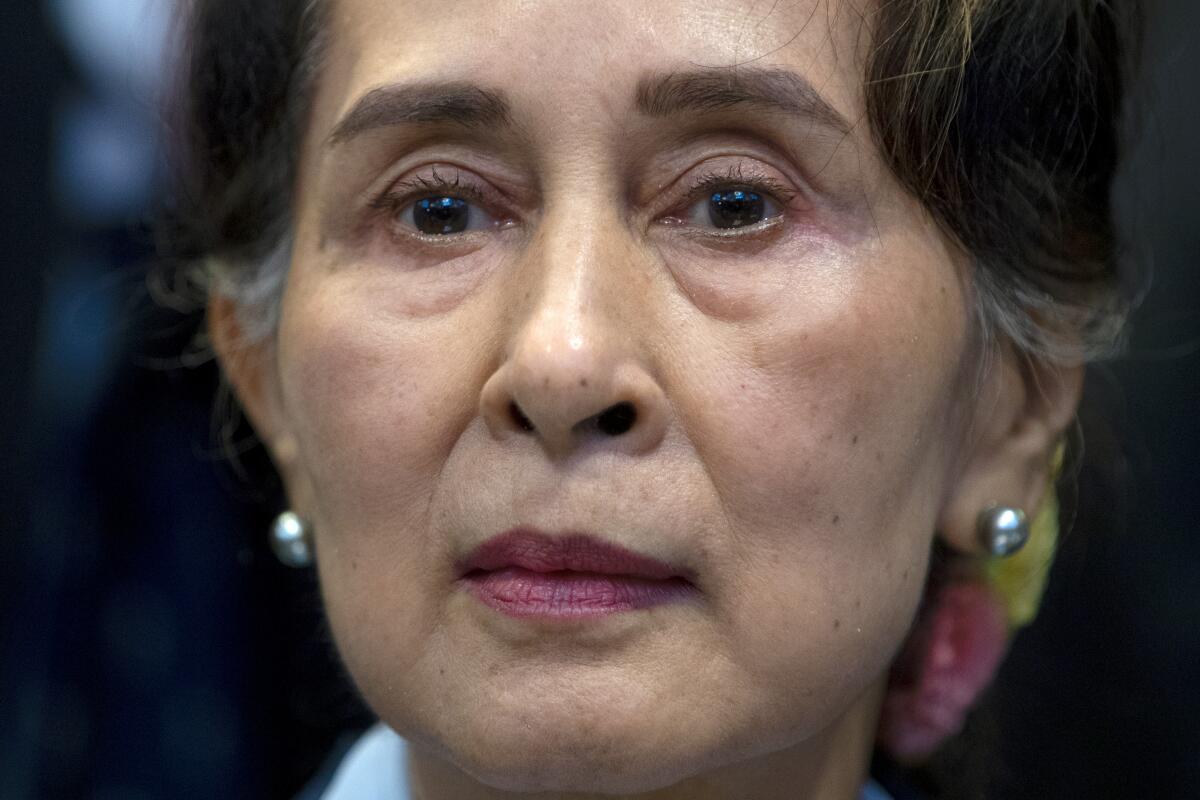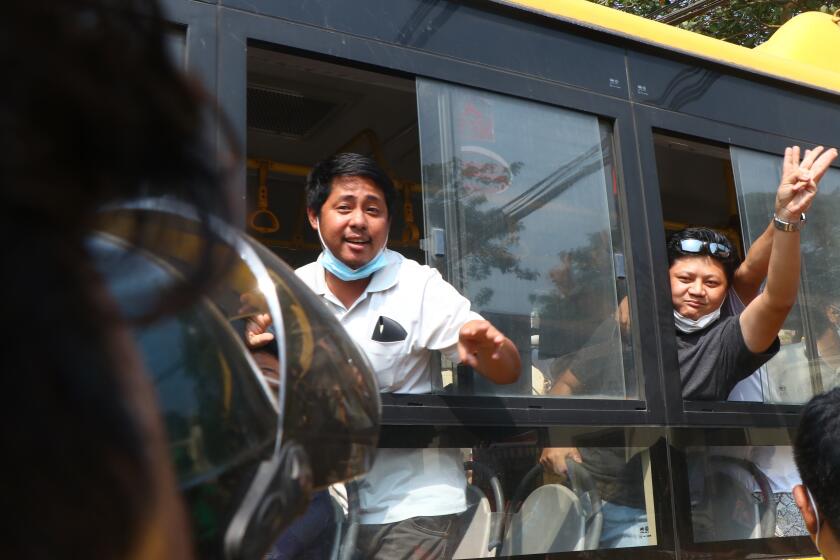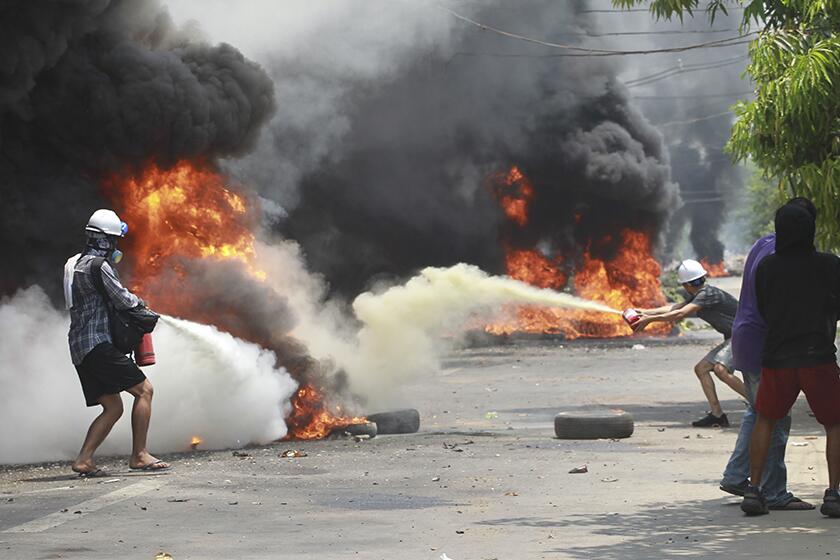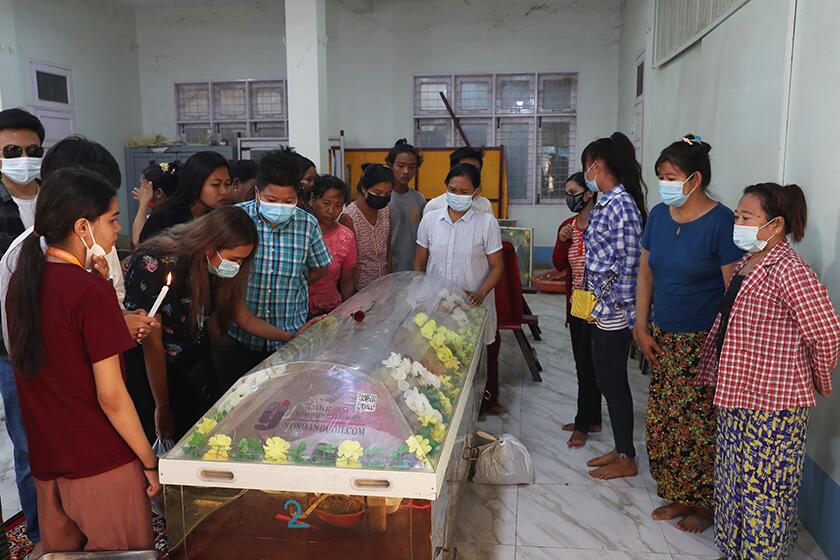Aung San Suu Kyi makes first in-person court appearance in Myanmar

- Share via
BANGKOK, Thailand — Myanmar’s ousted leader, Aung San Suu Kyi, appeared in court in person Monday for the first time since the military arrested her when it seized power Feb. 1, Myanmar media reported.
One of her lawyers, Min Min Soe, told the Associated Press by phone that Suu Kyi was able to meet with her defense team before her hearing began at a special court set up inside the city council building in Naypyidaw, the capital. The hearing’s purpose was procedural.
The lawyers also met with Win Myint, who was president in the government that Suu Kyi led as state counselor and who is a defendant on some of the same charges she faces.
Suu Kyi had been charged with several criminal offenses, but her only previous court appearances had been by video link, and she had not been allowed to meet in person with any of her lawyers.
Min Min Soe said Suu Kyi had a message for Myanmar’s people that her National League for Democracy party would stand by them. “Since the NLD was founded for the people, the NLD will exist as long as the people exist,” Min Min Soe said, apparently referring to the ruling junta’s threat to dissolve the party.
Khin Maung Zaw, head of Suu Kyi’s legal team, said the ousted leader “seems fit and alert and smart, as always.”
Protesters say labor strikes and civil disobedience are the only ways to dislodge the military dictatorship in Myanmar. It may mean pushing millions into poverty.
Monday’s hearing concerned several of the six charges Suu Kyi faces.
These are two counts of violating the Natural Disaster Management Law for disregarding COVID-19 pandemic restrictions during the 2020 election campaign; illegally importing walkie-talkies that were for her bodyguards’ use; unlicensed use of the radios; and spreading information that could cause public alarm or unrest.
The most serious charge Suu Kyi faces is breaching the colonial-era Official Secrets Act, which carries a penalty of up to 14 years’ imprisonment, but that is being handled by a separate court.
Suu Kyi’s supporters say the proceedings against her are politically motivated and meant to try to legitimate the military’s seizure of power and discredit her. If convicted of any of the offenses, she could be banned from running in the election that the junta has said it will hold within one or two years of its takeover.
On Armed Forces Day in Myanmar, security forces gunned down scores of unarmed protesters and passersby, according to local news reports, in the bloodiest massacre since the army seized power in a coup last month.
The military ousted Suu Kyi’s government less than three months after her National League for Democracy party won a landslide victory in a general election that would have given it a second five-year term in office. Before the start of democratic reforms a decade ago, Myanmar was ruled by the military for 50 years.
The junta claims it was justified in taking power because of alleged widespread electoral fraud, especially irregularities in the voting lists.
The Asian Network for Free Elections, a nonpartisan poll-watching organization, in a report issued last week rejected the military’s allegations of massive fraud, saying the results of November’s voting were representative of the will of the people.
On Friday, however, the head of Myanmar’s military-appointed state election commission said his agency would consider whether to dissolve Suu Kyi’s former ruling party for alleged involvement in electoral fraud and whether those involved “should be punished as traitors.”
Breaking News
Get breaking news, investigations, analysis and more signature journalism from the Los Angeles Times in your inbox.
You may occasionally receive promotional content from the Los Angeles Times.
The junta has accused Suu Kyi of corruption and presented on state television what it said was evidence that she took bribes, but has so far said only that it intends to pursue charges for that offense. Her lawyers dismiss the allegations.
Several cases are also pending against other senior members of Suu Kyi’s party in addition to Win Myint, the ousted president.
According to Myanmar’s Assistance Assn. for Political Prisoners, which has been keeping a detailed tally of arrests and deaths since the coup, almost 4,300 people are in detention, including 95 who have already been sentenced.
Resistance to military rule is widespread. About 100 young people gathered Monday in a lightning protest in Yangon, the country’s biggest city, carrying banners and chanting pro-democracy slogans before hurriedly dispersing.
Kyal Sin wore a T-shirt that said ‘Everything will be OK’ when she was shot by Myanmar security forces on the deadliest day since the military coup.
Flash mobs have replaced the mass demonstrations of February and March because of the lethal response of security forces. According to the assistance association, 818 protesters and bystanders have been killed by security personnel since the coup.
Junta chief Senior Gen. Min Aung Hlaing said in an interview last week with Hong Kong-based Phoenix Television that the death toll had been exaggerated and was actually about 300, and that 47 police had been killed and more than 200 injured.
Most resistance to the junta is still nonviolent, particularly a boycott of public schools, but armed resistance appears to be growing. There are reports virtually every day of small homemade explosives being set off in Yangon and elsewhere, and of some killings of alleged informers and local administrators appointed by the junta.
Reports on social media over the weekend said there was heavy fighting between security forces and members of a grass-roots anti-junta People’s Defense Force in Kayah state — also known as Karenni state — in eastern Myanmar. Such reports, especially in remote areas, are difficult to independently verify.
As many as 40 members of the security forces were killed in joint attacks launched by the People’s Defense Force and ethnic Karenni guerrillas, the online news services Irrawaddy and Myanmar Now reported. The Irrawaddy also said four civilians were killed when artillery fired by government forces hit a Roman Catholic Church in Kayah.
More to Read
Sign up for Essential California
The most important California stories and recommendations in your inbox every morning.
You may occasionally receive promotional content from the Los Angeles Times.













